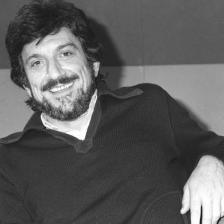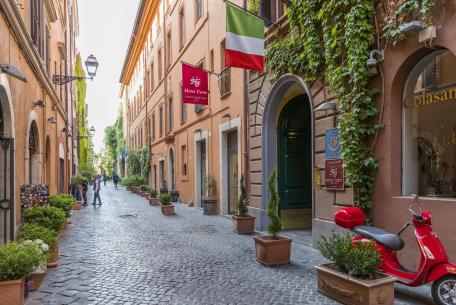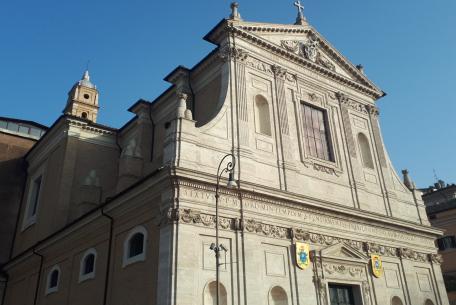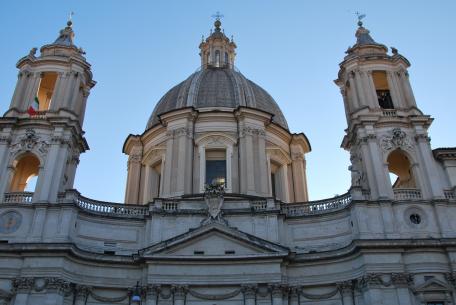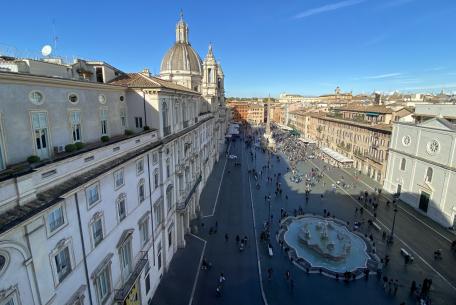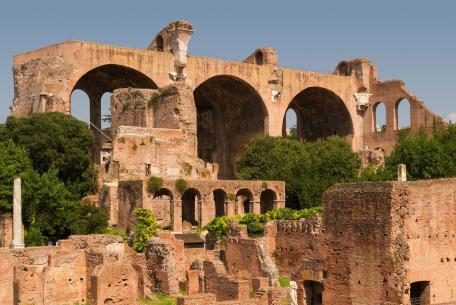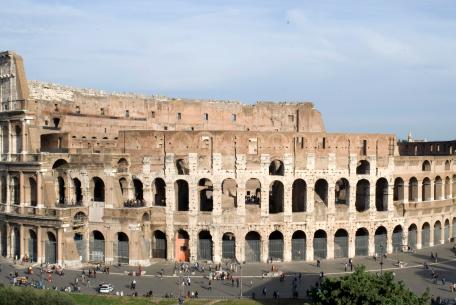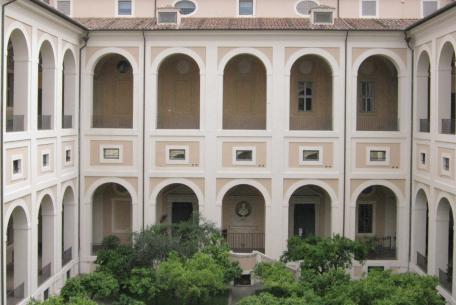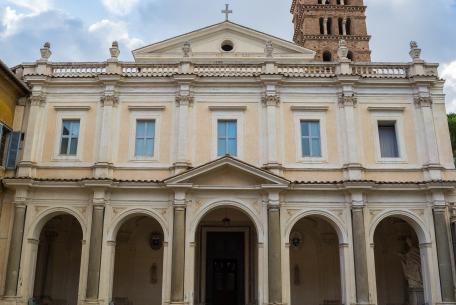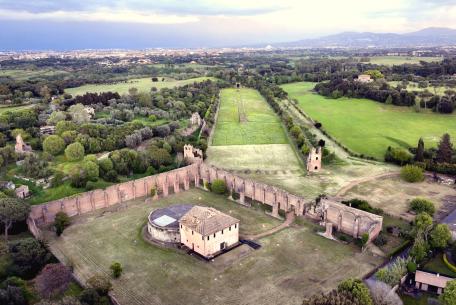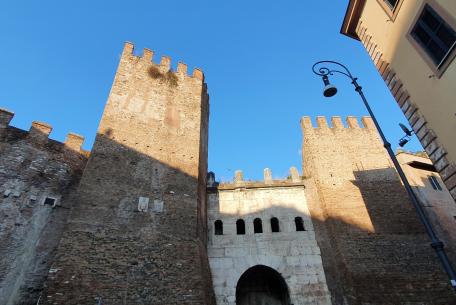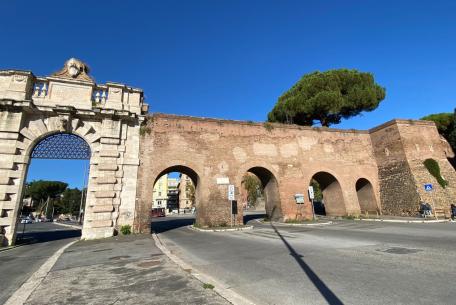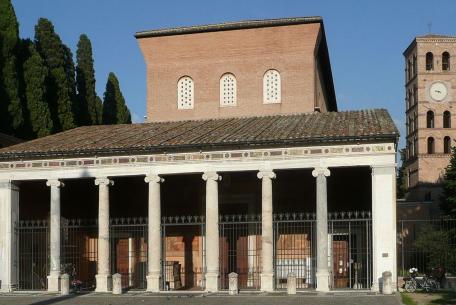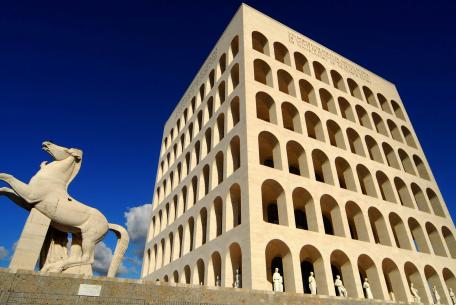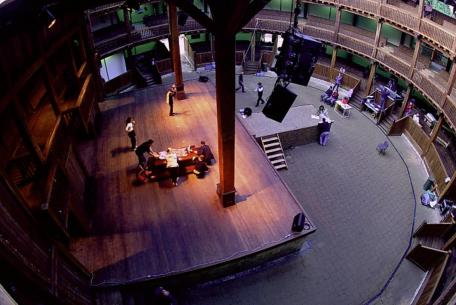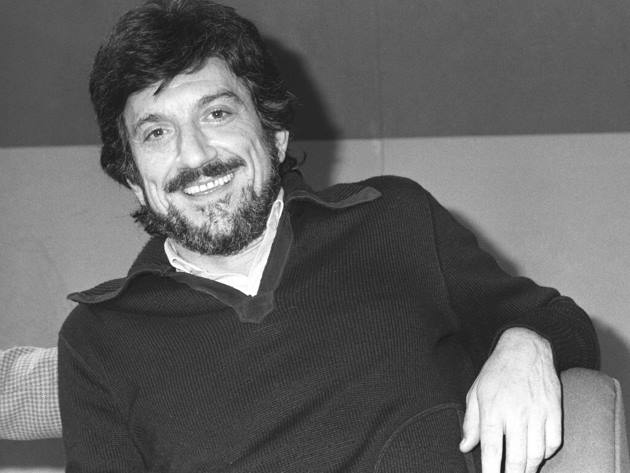
Gigi Proietti is considered one of Italy’s most histrionic and versatile actors: theatre and film actor, voice actor, TV presenter, and singer.
Luigi Proietti, aka Gigi, was born on 2nd November 1940, in Via Giulia, a historic street in Rome. He later moved to various districts of the city, including Tufello, where a street art work, a mural on the façade of the building where he lived, was dedicated to him. He debuted as a movie extra at the age of fifteen in Il nostro campione (1955), a film directed by Vittorio Duse. He actually made his real debut at the university (he never graduated, he was six exams away from his Law degree) with Centro Teatrale Universitario (University Theatre Centre) at today's Flaiano Theatre.
His artistic career was very long and boasted important collaborations both in the theatre and cinema industries. He worked with Mario Scaccia in Dürrenmatt's Romulus the Great (1964) and with Paolo Stoppa in Shakespeare's The Merchant of Venice, in theatre. He also joined the experimental theatre group “Teatro dei 101” together with Antonio Calenda. Meanwhile, he started getting into cinema, gaining a part in the film Lo scatenato (1967) next to Carmelo Bene directed by Franco Indovina, in the film Una ragazza piuttosto complicata (1969), directed by Damiano Damiani, and had part in The Appointment (1969), directed by Sidney Lumet. In that same period, he started dubbing important international actors, including Marlon Brando in Reflections in a Golden Eye (1967). In the 1970s he became established as an actor, thanks to his participation in the musical Alleluja brava gente (1970), directed by Garinei and Giovannini at the Sistina Theatre, for which he was awarded the "Silver Mask". In the same period, he also took part in the radio show Gran varietà obtaining extraordinary success.
From this moment on his career becomes a fast-moving sequence of film roles such as Tosca (1973) by Luigi Magni, La proprietà non è più un furto (1973) by Elio Petri and films that gave him great popularity such as Meo Patacca (1972) by Marcello Ciorciolini and Febbre da cavallo (1976), a "cult" film directed by Steno, which was later revived as Febbre da cavallo – La Mandrakata (2002), this time directed by Steno's son Carlo Vanzina and for whose performance he was awarded the "Silver Ribbon" as best leading actor. The collaboration and fellowship with the writer Roberto Lerici earned him the writing, direction, and interpretation of the shows A me gli occhi, please (1976), which were smashing hits with critics and audiences and which had many reruns even after several years.
He successfully played the Maresciallo Rocca for Television, broadcast on Rai Uno for eight seasons from 1996. One of his last performances was Mangiafuoco in the film Pinocchio (2019), directed by Matteo Garrone. Proietti died in Rome on the day of his birthday November 2nd, 2020.
The Silvano Toti Globe Theatre, where he served as an Art Director for several years, doing his utmost to make Shakespeare's works known to the audience, was recently dedicated to him.
CITY CENTRE
Via Margutta
Un’estate al mare, Carlo Vanzina (2008)
The scene, in which Giulio Bonetti (Gigi Proietti) returns to the dubbing studio where he works, is shot here.
Chiesa di San Girolamo degli Schiavoni
Via Tomacelli, 132
Febbre da Cavallo, Steno (1976)
The famous scene of "Whisky maschio" (macho whiskey), a hilarious sketch and a cult for many Italians, in which Mandrake (Gigi Proietti) improvises as an actor, is shot in the square of the Porto di Ripetta and the church in the background is the church of San Girolamo degli Schiavoni or Croati, the national church of the Croatians in Rome in the Rione Campo Marzio.
Piazza Adriana
Ma tu di che segno 6?, Neri Parenti (2014)
The building in the movie shot where the office of Attorney Giuliano De Marchis (Gigi Proietti) is located, is in Piazza Adriana in the Rione Borgo.
Santa Agnese in Agone
Via Santa Maria dell'Anima, 30/A - Piazza Navona
La Tosca, Luigi Magni (1973)
Luigi Magni chooses the church of Sant' Agnese in Agone in Piazza Navona to shoot the scene where painter Mario Cavaradossi (Gigi Proietti) is painting a fresco. The same church will also be at the centre of the scene in which news of Napoleon's defeat at Marengo is announced. The news would later turn out to be incorrect.
Piazza Margana
Febbre da Cavallo, Steno (1976)
In front of Palazzo Velli Cardelli in Piazza Margana, Rione Campitelli, a very funny scene of the film takes place in which Armando Pellicci (Enrico Montesano), known as “Er Pomata”, one of the "cavallari" (self-proclaimed horse experts) friends of Mandrake (Gigi Proietti), is waited on by Spartaco, known as "Er Ventresca" (Giancarlo Gregorini), to make him settle a debt. To escape this burden, Armando disguises himself and pretends to be sick.
Palazzo Capizucchi
Piazza Campitelli, 3
La Tosca, Luigi Magni (1973)
On her way out of this palace, also known as Palazzo Gasparri, Tosca (Monica Vitti) is filmed, having given herself to Baron Scarpia (Vittorio Gassman) to save Mario Cavaradossi (Gigi Proietti) from being shot for harbouring the political refugee Cesare Angelotti (Umberto Orsini).
Piazza d'Ara Coeli
Febbre da Cavallo, Steno (1976)
The bar, where Mandrake (Gigi Proietti) and his friends meet to decide how to get the money to bet on horse races, is located in front of Piazza d’Ara Coeli.
Basilica di Massenzio
Roman Forum - Piazza S. Maria Nova, 53
Meo Patacca, Marcello Ciorciolini (1972)
Meo Patacca (Gigi Proietti), asked by the Pope, is organizing the expedition to defend the city of Vienna, in front of the nave of the Basilica of Maxentius.
Tempio di Venere
Roman Forum - Piazza S. Maria Nova, 53
Meo Patacca, Marcello Ciorciolini (1972)
The expedition that Meo Patacca (Gigi Proietti) is organizing to defend Vienna from the Turks, is announced by his girlfriend, Sora Nuccia (Marilù Tolo), in front of the Temple of Venus between the Basilica of Maxentius and the Colosseum.
TRASTEVERE
Piazza di San Giovanni Della Malva
Febbre da Cavallo – La Mandrakata, Carlo Vanzina (2002)
Mandrake (Gigi Proietti) lives in a flat with his girlfriend Lauretta (Emanuela Grimalda) in Piazza di San Giovanni della Malva. A window, overlooking the square from which the church of San Giovanni della Malva in the Rione Trastevere can be seen, is framed in a scene.
Complesso Monumentale di San Michele a Ripa Grande
Porto di Ripa Grande, 23
Due pezzi di pane, Sergio Citti (1978)
The "two pieces of bread" (hearts of gold), as the Romans say, referring to people who are too good-hearted, Pippo (Vittorio Gassman) and Peppe (Philippe Noiret) end up in jail, as predicted by the innkeeper (Gigi Proietti) of the Pizzeria dell'Uovo they frequent. The location chosen for this scene is the Monumental Complex of San Michele a Ripa Grande, located in the Rione Trastevere and along what was once the Port of Ripa Grande.
AVENTINO and APPIA ANTICA
Via di Sant'Alessio
Bordella, Pupi Avati (1976)
Not far from the Basilica of St. Alexis and Boniface, in the Rione Ripa, is the fictional villa in Milan, housing The American Love Company.
Basilica di Santa Maria Balbina
Piazza di San Balbina, 8
Una ragazza piuttosto complicata, Damiano Damiani (1969)
In front of the Basilica of Santa Balbina Vergine e Martire, an early-Christian church in the Rione San Saba, Claudia (Catherine Spaak), engaged to Pietro (Gigi Proietti) meets Alberto (Jean Sorel), a man whom she meets accidentally during a telephone interference, a rather common occurrence in the 1960s.
Circo di Massenzio
Via Appia Antica, 153
Meo Patacca, Marcello Ciorciolini (1972)
Here is where the scene is shot in which Meo Patacca, after announcing his departure to defend Vienna, is carried in triumph by a group of Romans gathered to celebrate his jubilation.
SAN LORENZO
Porta Tiburtina
Una ragazza piuttosto complicata, Damiano Damiani (1969)
The scene, where Pietro (Gigi Proietti) is spying on Claudia (Catherine Spaak) and Alberto (Jean Sorel) as they return to their car, is backgrounded by Porta Tiburtina or Porta di San Lorenzo, one of the many entrance gates to the Aurelian Walls.
Chiesa di San Lorenzo fuori le Mura
Piazzale del Verano
La proprietà non è un furto, Elio Petri (1973)
In front of this church, Paco the Argentinian (Gigi Proietti) in order to honor his friend Albertone (Mario Scaccia), who died helping Total (Flavio Bucci) rob a rich butcher (Ugo Tognazzi) of all his possessions, delivers the funeral speech.
E.U.R.
Largo Virgilio Testa
Febbre da Cavallo – La Mandrakata, Carlo Vanzina (2002)
The scene in which Mandrake (Gigi Proietti) shares the money of a winnings with his friends was shot in this wide area, under one of the mythological statues sculpted by the artist Dino Basaldella, representing Chimera fighting against the centaur and Chimaera fighting against the Minotaur.
Palazzo della civiltà del Lavoro
Quadrato della Concordia
Conviene fare bene l'amore, Pasquale Festa Campanile (1975)
This is the setting of the scene where Prof. Coppola (Gigi Proietti) explains to the state authorities the reason why, in the institute he runs, they manage to get enough energy so that the lights stay on.
ROME’S COAST
Lungomare Amerigo Vespucci
Castel Fusano
Una ragazza piuttosto complicata, Damiano Damiani (1969)
On the Amerigo Vespucci promenade in Castel Fusano, on a beach resort, Pietro (Gigi Proietti), now married to Claudia (Catherine Spaak), meets Alberto (Jean Sorel) to beat him up after he tries to meet her again.
Silvano Toti Globe Theatre Gigi Proietti
Located in the heart of Villa Borghese, it was built to celebrate the 100th anniversary of Villa Borghese, thanks to the Toti family Foundation established in memory of Silvano Toti. The art direction was entrusted to Gigi Proietti, who while serving as Art Director poured his heart and soul into this theatre, so much so that the city of Rome wanted to pay homage to him by adding on his name.
 Condividi
Condividi













































